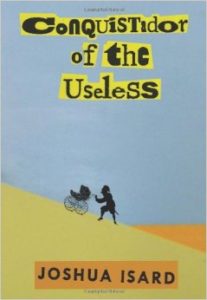[The biggest physical challenge of being a writer is] definitely the discomfort that comes with sitting in a chair all day, performing repetitive motions.
I get hand cramps and stiffness. Shooting pains up my neck. Headaches on long days.
The neck pains I find I can get rid of well with consistent stretching, but the finger pains are a little different. Stretching still helps, but using the right keyboard makes a huge difference.
I like the Apple wireless keyboard: it’s on an incline, which is essential. The flat keyboards on a laptop kill me, for whatever reason, and the keyboard on an iPad’s screen is too cramped.
Years of Work = Shouting Into a Void?
At first it was rejection [that was the biggest emotional challenge], but I think anyone who’s going to be a writer gets over that relatively quickly. It’s never fun getting your work rejected, but it happens so much that you have to become immune to it.
Now it’s jealousy. I see my contemporaries winning awards, getting big publishing contracts, being reviewed in the most prestigious publications—and while I’m happy with my novel and its reception, let’s be honest, it didn’t light the world on fire.
Nor do most published books. Sometimes that’s tough to deal with.
It can feel like years of work results in shouting into a void, and other books that aren’t objectively any better than mine get feted upon.
Writer’s Jealousy is a Pretty Worthless Thing
I think the first step to getting through this is recognizing that writing is not a zero-sum game. There’s room out there for as many good books as people can write.
And it’s not like other writers are out to get anyone. Almost everyone I know in this community is down to Earth, modest about their accomplishments. And we all know that there’s a lot of luck involved as far as landing an agent, getting that publishing deal, and getting reviewed.
Those things make it easier for me to remember that jealousy is a pretty worthless thing, and I ought not to pay attention to it.
Also, people have been writing about writer’s jealousy for a long time (The Black Prince by Iris Murdoch, The Finkler Question by Howard Jacobson, Wonder Boys by Michael Chabon). This makes me feel a little less crazy.
Writing is the Art of Wasting Pages
Two failed novels before one that worked, more stories rotting on my cloud drive than in journals—there’s no one dark moment, but rather a growing dark part of my career. Of every writer’s career.
And, the fact that everyone goes through it is what helps me get past it.
By no means am I the only one who’s put in hours of work that have yielded no results.
It’s never easy, looking at all those documents, knowing how much time went into them and that nothing will come of it. But, that’s how writing goes.
Chuck Palahniuk, I think, said that writing is the art of wasting pages.
If he thinks so, it’s ok for us to waste plenty of pages as well, and not let that hang over us.
I Write Because Not Writing is Worse
I’m compelled by something in my makeup to write stories. I don’t know if it’s genetic or if it’s because I spent so much time reading books and watching movies as a kid, but there’s something there.
Someone once said that they write because not writing is worse. That pretty much sums it up for me.
A Writer is Beholden to No One But Himself
If a young person told me he wanted to be a writer, and wondered what the hardest part would be, I would tell him the complete lack of validation.
One of the relieving things about writing is that, for the most part, no one cares what you do. This means that a writer is beholden to no one but himself.
However, after spending years on a manuscript and finally getting it published, it’d be nice to have a lot of people telling you what a good job you did. But that’s not what happens.
Maybe a few hundred people read it. Most of them never tell you anything about it, and that’s it. The jealousy of well-reviewed books comes in here as well.
The only way to get over it, really, is to only write for yourself. Because you want to.
There’s no other reason at all to do this, and as long as you focus on being satisfied with your own work on your own terms, the validation issue fades.
* * *
Joshua Isard grew up in the Philadelphia area, earned his BA in English at Temple University, and then went on to study creative writing at the University of Edinburgh and literature at University College London. His short stories have appeared in The Broadkill Review, Press 1, Northwind, and Storychord, and his first novel is now available from Cinco Puntos Press.
He is currently the director of the MFA Program in Creative Writing at Arcadia University in Glenside, PA. He lives outside Philadelphia with his wife, newborn daughter, and two cats. For more information on Joshua and his writing, please see his website, or connect with him on Twitter, Facebook, and Goodreads.
 Conquistador of the Useless: Nathan Wavelsky, a happy-go-lucky slacker, has no trouble being successful as a mid-level corporate manager. He doesn’t care, he does what’s he’s told and the boat doesn’t rock.
Conquistador of the Useless: Nathan Wavelsky, a happy-go-lucky slacker, has no trouble being successful as a mid-level corporate manager. He doesn’t care, he does what’s he’s told and the boat doesn’t rock.
But then he gives Vonnegut’s Cat’s Cradle to a teenage girl and her parents are righteously appalled. His wife decides she wants a baby.
His best friend wants him to climb Mount Everest with him. Shit begins to happen. Available at Cinco Puntos, Amazon, and Barnes & Noble.

